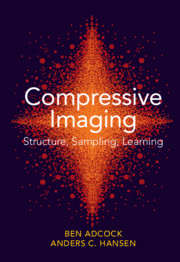Refine search
Actions for selected content:
2540 results in Computational Science
Frontmatter
-
- Book:
- Compressive Imaging: Structure, Sampling, Learning
- Published online:
- 16 July 2021
- Print publication:
- 16 September 2021, pp i-iv
-
- Chapter
- Export citation
Appendix C - Probability
- from Appendices
-
- Book:
- Compressive Imaging: Structure, Sampling, Learning
- Published online:
- 16 July 2021
- Print publication:
- 16 September 2021, pp 542-545
-
- Chapter
- Export citation
Index
-
- Book:
- Compressive Imaging: Structure, Sampling, Learning
- Published online:
- 16 July 2021
- Print publication:
- 16 September 2021, pp 596-602
-
- Chapter
- Export citation
Preface
-
- Book:
- Compressive Imaging: Structure, Sampling, Learning
- Published online:
- 16 July 2021
- Print publication:
- 16 September 2021, pp xiii-xvi
-
- Chapter
- Export citation
Part IV - Compressed Sensing for Imaging
-
- Book:
- Compressive Imaging: Structure, Sampling, Learning
- Published online:
- 16 July 2021
- Print publication:
- 16 September 2021, pp 349-352
-
- Chapter
- Export citation
References
-
- Book:
- Compressive Imaging: Structure, Sampling, Learning
- Published online:
- 16 July 2021
- Print publication:
- 16 September 2021, pp 568-595
-
- Chapter
- Export citation
15 - Sampling Strategies for Compressive Imaging
- from Part IV - Compressed Sensing for Imaging
-
- Book:
- Compressive Imaging: Structure, Sampling, Learning
- Published online:
- 16 July 2021
- Print publication:
- 16 September 2021, pp 353-372
-
- Chapter
- Export citation
Appendix E - Fourier Transforms and Series
- from Appendices
-
- Book:
- Compressive Imaging: Structure, Sampling, Learning
- Published online:
- 16 July 2021
- Print publication:
- 16 September 2021, pp 553-555
-
- Chapter
- Export citation
17 - Total Variation Minimization
- from Part IV - Compressed Sensing for Imaging
-
- Book:
- Compressive Imaging: Structure, Sampling, Learning
- Published online:
- 16 July 2021
- Print publication:
- 16 September 2021, pp 403-426
-
- Chapter
- Export citation
5 - An Introduction to Conventional Compressed Sensing
- from Part II - Compressed Sensing, Optimization and Wavelets
-
- Book:
- Compressive Imaging: Structure, Sampling, Learning
- Published online:
- 16 July 2021
- Print publication:
- 16 September 2021, pp 105-128
-
- Chapter
- Export citation
9 - Wavelets
- from Part II - Compressed Sensing, Optimization and Wavelets
-
- Book:
- Compressive Imaging: Structure, Sampling, Learning
- Published online:
- 16 July 2021
- Print publication:
- 16 September 2021, pp 188-221
-
- Chapter
- Export citation
Appendices
-
- Book:
- Compressive Imaging: Structure, Sampling, Learning
- Published online:
- 16 July 2021
- Print publication:
- 16 September 2021, pp 525-527
-
- Chapter
- Export citation
1 - Introduction
-
- Book:
- Compressive Imaging: Structure, Sampling, Learning
- Published online:
- 16 July 2021
- Print publication:
- 16 September 2021, pp 1-26
-
- Chapter
- Export citation
Abbreviations
-
- Book:
- Compressive Imaging: Structure, Sampling, Learning
- Published online:
- 16 July 2021
- Print publication:
- 16 September 2021, pp 567-567
-
- Chapter
- Export citation
13 - Local Structure and Uniform Recovery
- from PART III - Compressed Sensing with Local Structure
-
- Book:
- Compressive Imaging: Structure, Sampling, Learning
- Published online:
- 16 July 2021
- Print publication:
- 16 September 2021, pp 305-333
-
- Chapter
- Export citation
7 - Optimization for Compressed Sensing
- from Part II - Compressed Sensing, Optimization and Wavelets
-
- Book:
- Compressive Imaging: Structure, Sampling, Learning
- Published online:
- 16 July 2021
- Print publication:
- 16 September 2021, pp 142-165
-
- Chapter
- Export citation
Contents
-
- Book:
- Compressive Imaging: Structure, Sampling, Learning
- Published online:
- 16 July 2021
- Print publication:
- 16 September 2021, pp vii-xii
-
- Chapter
- Export citation
Appendix A - Linear Algebra
- from Appendices
-
- Book:
- Compressive Imaging: Structure, Sampling, Learning
- Published online:
- 16 July 2021
- Print publication:
- 16 September 2021, pp 528-536
-
- Chapter
- Export citation

Compressive Imaging: Structure, Sampling, Learning
-
- Published online:
- 16 July 2021
- Print publication:
- 16 September 2021

Archaeology in the Digital Era
- Papers from the 40th Annual Conference of Computer Applications and Quantitative Methods in Archaeology (CAA), Southampton, 26-29 March 2012
-
- Published by:
- Amsterdam University Press
- Published online:
- 16 February 2021
- Print publication:
- 01 February 2014
